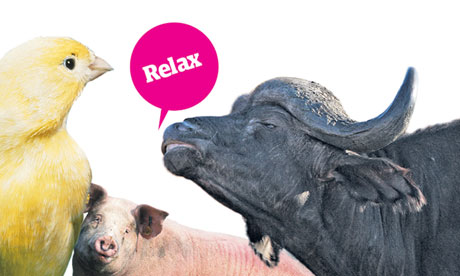
During an interview with the Radio Times this week, Prince William showed that he had inherited his dad's love of nature (and of good soundbites). "I've got hundreds of animals on my iPhone," he said, "noises and sounds of the bush, so if I am having a stressful day, I'll put a buffalo, a cricket or a newt on and it takes you back instantly. And it does completely settle me down." It makes a change from David Cameron pretending to be into Alt-J and Rudimental, but can safari sounds really produce relaxing effects?
The British Library's natural sound curator Cheryl Tipp believes so, although she doesn't think Prince William's choices will suit everyone: "We all have our favourites – whether that be a beautiful bird song, the churring of grasshoppers, a rhythmic frog chorus, lapping waves or the calls of buffalo. Sound is incredibly evocative and has the power to instantly transport us to another place. As Africa holds such a special place in William's heart, it's not surprising that the sounds of these species have the ability to relieve any stress that he's feeling, although I can't say that they would work for me!"
Matthew Herbert, the creative director of the New Radiophonic Workshop, who has made music sampling everything from pigs, bombs and even William and Kate's wedding vows, agrees. "I'm assuming the buffalo sound William has isn't the sound of 5,000 of them charging at him. Presumably, the sound he has is of a couple of them at most chewing on grass. I can send him the relaxing sound of my children eating porridge if he needs some variation."
What would the experts suggest for Royal Chill Vol 2? Top of Tipp's list "would be a thunderstorm. There are few things more calming than listening to the gentle patter of rainfall and rolling thunder. Birdsong would be another must. A beautiful dawn chorus from one of Britain's great woodlands always brings with it an air of hope. Further afield I would recommend the haunting song of loons drifting across the great lakes of the Canadian wilderness or the exotic sounds of the Australian bush."
For Eleanor Ratcliffe, a PhD student whose work "explores how natural sounds can improve mood and attention after stress or fatigue", rather than buffalo ("that struck me as very interesting because it's kind of a dangerous sound, isn't it? A wild beast – not a pretty little bird that's not going to do you any harm, it's something a bit more primal than that") it would be "wood pigeons and blackbirds. Pleasant-sounding birds, tuneful, with a melody: the blackbird, the robin, the wren."
For Herbert, though, birdsong is a "cliche of relaxing nature" because "its presence usually indicates the absence of imminent danger. It will drown out the sound of a murderous revolutionary throng seeking to restore equality and to ask for its annual allowance of £33.3m back." Instead, he would "recommend the sound of a pig in labour. As the pig roams the stall, it creates a nice rustle of straw to accompany the regular, and at times heavy, breathing."
Perhaps there is one sound that could make everyone happy. As part of her research, Ratcliffe interviewed someone who went to a house party where there was a pet canary. "The bird was making little tuneful additions to the DJing as the DJ scratched "tweet, tweet, tweet", "wiki-wiki-wiki". The DJ and the bird ended up doing a duet. I don't know if DJ found it relaxing, but he certainly found it a creative experience."

